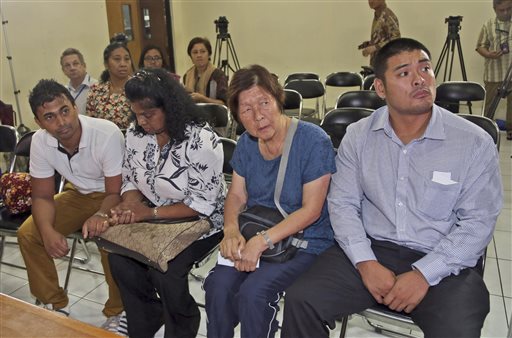Indonesia moving 2 Aussies, 5 other foreigners for execution

Mothers and brothers of condemned Australians, Myuran Sukumaran and Andrew Chan, from left to right, Chintu Sukumaran, Raji Sukumaran, Helen Chan and Michael Chan, wait to meet the National Commission For Human Rights in Jakarta Indonesia, Monday, Feb. 9, 2015. Indonesia said last week it was preparing to execute eight drug smugglers, including Sukumaran and Chan, the ringleaders of a group of nine Australians who were arrested in 2005 for attempting to smuggle 8.3 kilograms of heroin to their home country from the tourist island of Bali. AP Photo/TATAN SYUFLANA
JAKARTA, Indonesia—Eight convicted drug smugglers, including seven foreigners, will be transferred to an Indonesian prison island this week for imminent execution despite international appeals for clemency, an official said Monday.
Among the eight are Andrew Chan, 31, and Myuran Sukumaran, 33, the ringleaders of a group of nine Australians arrested in 2005 for attempting to smuggle 8.3 kilograms (18.3 pounds) of heroin to Australia from the Indonesian resort island of Bali. The seven other members of the group—dubbed the “Bali Nine” by Australian media—have received prison sentences ranging from 20 years to life.
In addition to Chan and Sukumaran, five men from France, Brazil, Ghana, Nigeria and Indonesia, and a woman from the Philippines, will face a firing squad after being moved to Nusa Kambangan prison, Attorney General’s Office spokesman Tony Spontana said, without giving exact dates. Six other drug smugglers, including five foreigners, were executed in January at the same prison, located off Indonesia’s main island of Java.
Indonesian President Joko “Jokowi” Widodo has rejected appeals by Australia’s government for clemency for Chan and Sukumaran, and vowed not to grant mercy to any other drug offenders because Indonesia is suffering a “drug emergency.”
Australia has abolished capital punishment and opposes executions of any Australian overseas.
Article continues after this advertisementLawyers for the two Australians, who are currently being held at a Bali prison, filed a complaint in an administrative court last week to challenge Jokowi’s rejection of the appeals, arguing that it was made without consideration of their remorse and rehabilitation. A hearing on the complaint is scheduled for next week.
Article continues after this advertisementSpontana, however, said the executions would not be delayed. “Their legal options were exhausted after their clemency was rejected by the president,” he said. “The next step is execution.”
In Australia earlier Monday, Prime Minister Tony Abbott said he had personally appealed to Jokowi to stop the executions.
“Like millions of Australians, I feel sick in the pit of my stomach when I think about what is quite possibly happening to these youngsters,” he told reporters.
Abbott said his government has been trying to appeal to Indonesia’s sense of itself as a stable democracy under the rule of law.
“What I don’t want to do is turn this into some kind of test of strength,” he said. “I think we are much more likely to back the Indonesians into a corner than to get the result we want.”
Indonesian Foreign Ministry officials met with embassy representatives from the foreign death row inmates’ countries Monday to discuss the executions. The representatives and the Indonesian officials declined to talk to the media after the meeting.
United Nations human rights experts have expressed concern at reports indicating trials for some of the defendants did not meet international standards of fairness and have called for an immediate halt to further executions in Indonesia.
Indonesia has extremely strict drug laws. On Jan. 18, it executed six drug convicts by firing squad, including foreigners from Brazil, Malawi, Nigeria, the Netherlands and Vietnam, brushing aside last-minute appeals by foreign leaders.
There are 133 people on death row in Indonesia, including 57 for drug crimes and two convicted terrorists.–Niniek Karmini with Kristen Gelineau in Sydney and Matthew Pennington in Washington